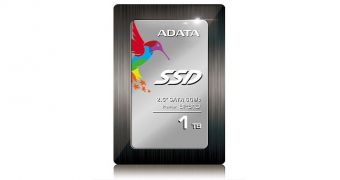When it comes to the solid-state drive market, there aren't very high odds that anything will score a point over the new M.2 unit that Samsung released, but that doesn't mean that all other units, like the one ADATA has just revealed, will be pushed aside.
Indeed, even if the majority of solid-state drive makers come to favor M.2 models after a while, it will take a fair bit of time for the transition to happen.
Besides, it's not like the M.2 interface will ever replace SATA, especially not while hard disk drives are still around.
So 2.5-inch drives will not be in direct competition with M.2 for a while. Besides, it's not like there are many motherboards with support for them.
So ADATA's latest addition to the 2.5-inch SSD worldwide market is as likely to succeed as all its peers, maybe a bit more thanks to the capacity of up to 1 TB.
Sure, the unit does come in the more “normal” 128 GB, 256 GB and 512 GB versions, but 1 TB is the top option, which is pretty rare for NAND Flash-based storage units of this size. The cases even manage to stay 7 mm thin.
You still get a 2.5 mm spacer and the 3.5-inch converter tray though. No need to ensure that the product is unsupported by PC cases lacking in 2.5-inch bays after all.
The new ADATA SSD is called Premier SP610 and runs on just 80 mW of energy, while ensuring the integrity of the data within with built-in BCH ECC (Error Correcting Code, up to 66bit/1KB).
And all the while, the performance is of up to 560 MB/s when reading a file, and 450 MB/s when writing it.
Like for all NAND-flash-based products, however, speed depends on capacity, on how many chips can work at once as it were. In other words, the 128 GB drive is the slowest, while the 1 TB unit is the fastest.
If ADATA had chosen to use a SandForce controller chip instead of an SMI one, performance may have been even higher, for writing at least. The price would have suffered though.
As for random 4K performance, it is of 73,000 read and 72,000 write IOPS (input/output operations per second). Sadly, the company hasn't disclosed the prices of the ASATA Premier SP610 solid-state drives. A shame, though it's clear that you'll need a fair bit of petty cash to upgrade from an HDD to SSD.

 14 DAY TRIAL //
14 DAY TRIAL //